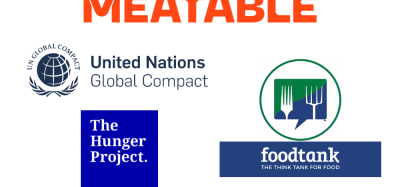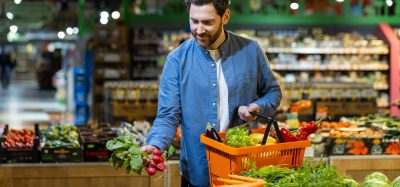Sustainability and PepsiCo UK: meeting the challenge together
- Like
- Digg
- Del
- Tumblr
- VKontakte
- Buffer
- Love This
- Odnoklassniki
- Meneame
- Blogger
- Amazon
- Yahoo Mail
- Gmail
- AOL
- Newsvine
- HackerNews
- Evernote
- MySpace
- Mail.ru
- Viadeo
- Line
- Comments
- Yummly
- SMS
- Viber
- Telegram
- Subscribe
- Skype
- Facebook Messenger
- Kakao
- LiveJournal
- Yammer
- Edgar
- Fintel
- Mix
- Instapaper
- Copy Link
Posted: 12 December 2009 | Emma Clarke, Sustainability Manager, PepsiCo UK | No comments yet
PepsiCo UK & Ireland (PIUK) employs over 5,500 people across 13 locations, including the largest crisp manufacturing plant in the world located in Leicester, the Quaker Oats factory at Cupar in Scotland, Copella apple juice bottled at Boxford in Suffolk and a number of other manufacturing, distribution and administration sites. Our core brands are Walkers, Quaker, Tropicana and Pepsi – but our business also includes a wide range of other products, including Planet Lunch, Snack a Jacks and SunBites.
PepsiCo UK & Ireland (PIUK) employs over 5,500 people across 13 locations, including the largest crisp manufacturing plant in the world located in Leicester, the Quaker Oats factory at Cupar in Scotland, Copella apple juice bottled at Boxford in Suffolk and a number of other manufacturing, distribution and administration sites. Our core brands are Walkers, Quaker, Tropicana and Pepsi - but our business also includes a wide range of other products, including Planet Lunch, Snack a Jacks and SunBites.
PepsiCo UK & Ireland (PIUK) employs over 5,500 people across 13 locations, including the largest crisp manufacturing plant in the world located in Leicester, the Quaker Oats factory at Cupar in Scotland, Copella apple juice bottled at Boxford in Suffolk and a number of other manufacturing, distribution and administration sites. Our core brands are Walkers, Quaker, Tropicana and Pepsi – but our business also includes a wide range of other products, including Planet Lunch, Snack a Jacks and SunBites.
In this article, I am going to talk about the environmental challenges facing PepsiCo and how we are changing the way we work to grow sustainably whilst reducing our impact on the planet, within and outside our four walls. I will share our total supply chain approach to tackling these challenges, which focuses on three key areas: addressing climate change, resource depletion and water shortages – issues where we believe we have the greatest ability to act and influence. Finally, I will demonstrate a supply chain approach in action, with the example of Walkers Crisps.
Environmental challenges
Our business relies on a vibrant society to grow and succeed, and we all rely on a healthy planet to support our activities and ways of life (Figure 1). Climate change, unpredictable weather patterns and scarce resources affect our business, our consumers and their future.
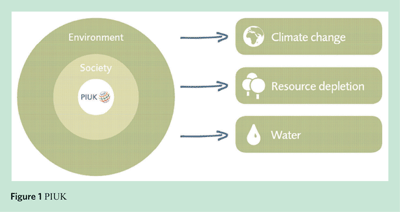

We are critically reliant on agriculture. Every flood, every drought and every crop failure impacts our business. It disrupts our farmers and growers, it lowers their yields, it increases our waste levels – and it hits our bottom line. Floods, droughts and bad harvests are seen as somehow medieval, or happening in Africa. However, the British floods of 2007 seriously damaged the potato crop on which our Walkers business depends – 100 per cent of our potatoes are sourced from the UK. Thousands of tonnes of them rotted in the ground. Droughts in the Ukraine in 2007 wrecked the sunflower crop, forcing up the price of the healthier oil we use to cook Walkers – and at the start of a recession – the worst possible timing. Studies from the UN, European Union, WWF and others show that water scarcity threatens agricultural production in Australia, Southern Spain, Portugal and Eastern Europe – where the farmers grow the wheat, oats, oranges and other crops that our brands rely on. In the UK too, the impacts of climate change will be serious and obvious. Crops like potatoes, grown in the South East since arriving with Walter Raleigh, farmed for generations by the same families, will no longer be viable. Rising temperatures could allow the Thames Valley to host olive groves or rice paddies. Or they would if we had the water to support them.
Fresh water is not simply vital to sustain human life, but also our business operations and our supply-chain. Today, the earth’s water has to be shared by a population of some six billion people, rising to eight billion by 2030 – and the Office for National Statistics have estimated the UK alone will gain a further 15 million people. Food production will need to double to feed the growing global population yet there are finite limits to key natural resources such as coal, oil and gas but also forests and agricultural land. The UN has estimated that 300 million hectares of former farmland are now too degraded to produce food.
The scale of these challenges is enormous. Every one of these trends is immense, virtually set in stone. However, how the world, or PepsiCo, reacts to these challenges is not.
Our approach to tackling the challenges of sustainability
In order for our business to grow sustainably, we are changing the way we work to reduce our impact on the planet, within and outside our four walls. We have focused our efforts on addressing climate change, resource depletion and water shortages issues where we believe we have the greatest ability to act and influence. To be truly sustainable requires us to undergo transformational change and we can’t achieve it alone.
Measure to manage: Making and delivering public commitments
We have embarked on this journey by making environmental commitments and reviewing the progress we make towards achieving them. We aim for our business to have a positive impact on the environment, sustaining our planet for future generations.
In our first ever Environmental Sustainability Report, released in 2008, we published a number of environmental pledges promising short-term action and long-term transformation, inside our business – and as an agent for change across our supply chain. This year, we produced a one-year-on update with details on how we are progressing towards our public commitments, including our evolving response to the challenges of environmental sustainability.
During 2008, we reduced our energy and water use and radically cut our waste sent to landfill and invested real time and effort, during the current economic crisis, into long-term solutions. We have also redoubled our efforts to bring outside expertise into our business, partnering or taking advice from the Carbon Trust, Carbon Disclosure Project, WWF, Forum for the Future and a host of others.
In the past, business growth went hand in hand with increased environmental impacts. To become a truly sustainable business, this link must be broken. In 2008, we held our absolute carbon footprint flat – despite our business growing by almost 10 per cent (Figure 2).
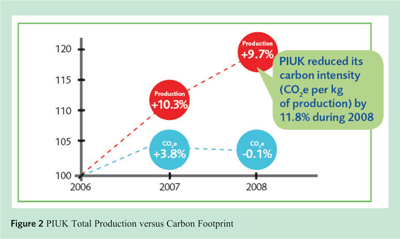

We are committed to reducing our greenhouse gas emissions, focusing on where the largest reductions can be delivered. The vast majority of our direct carbon footprint comes from the energy used to power our factories (Figure 3). A central plank of our low carbon strategy is ensuring all energy used in PIUK manufacturing and distribution is from renewable sources. Delivering this pledge will be stretching, and involve replacing much of our existing manufacturing and distribution infrastructure.
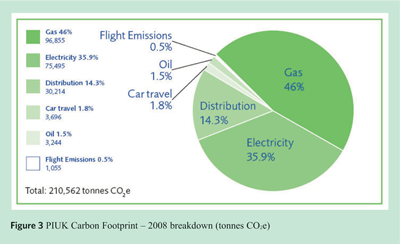

In 2008, PepsiCo UK doubled its share of electricity from renewables from eight per cent to 16 per cent – exceeding the initial target, and substantially ahead of UK average of 5.5 per cent. We are exploring options for renewable energy generation for each of our UK manufacturing sites, including a wind turbine at our Walkers factory in Skelmersdale, an anerobic digestion plant at Copella in Boxford (which will convert waste apple peel to energy), and a CHP biomass boiler at our Quaker factory in Cupar (to convert oat husks to heat and energy). At our Walkers manufacturing sites, we’re developing the technology which will enable us to capture the water extracted from potatoes before frying, and use it for all our factories’ water needs, allowing us to disconnect completely from the water mains and achieve zero water intake.
However, the majority of our impact lies outside our four walls. A life-cycle assessment of Walkers Crisps, for example (Figure 4), identified that 53 per cent of the product’s carbon footprint is generated through the supply chain. Working with our suppliers to develop carbon reduction strategies is therefore the only way to reduce our overall carbon footprint. We must use our positive influence to act as an agent for change with our supply chains: collaborating with our suppliers, growers and others to minimise our overall environmental impact. Working on sustainability with diverse suppliers, from family farmers to multinational companies, can prove challenging. However, if we are serious about tackling the issue of climate change, it is fundamental that we take action together.
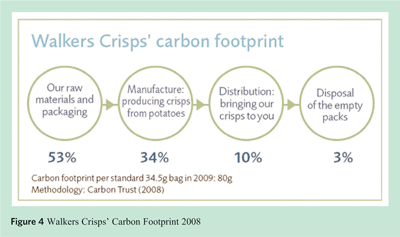

A total supply chain approach to sustainability: Walkers Crisps
The Walkers’ Carbon Reduction Programme demonstrates how we are working collaboratively with our supply chain to reduce our environmental footprint: both upstream with our suppliers, and downstream by driving consumer awareness.
In 2007, Walkers became the first brand in the world to place a Carbon Reduction Label on a consumer product. The Label was the culmination of work with the Carbon Trust that had been underway since 2005 to develop a methodology for assessing a product’s carbon footprint, from the field where the potatoes are grown through to the disposal of the crisp packet after the crisps have been enjoyed. Along the way, Walkers took steps to reduce the carbon footprint of its crisps. But the Label did not just show past achievements. In applying the Label, Walkers made a public commitment to deliver further reductions to the footprint within two years. This public commitment gave impetus to carbon saving initiatives and to new ways of working with suppliers.
The Carbon Reduction Label and its public commitment to reduce Walkers’ carbon footprint captured people’s attention and galvanised change within the Walkers business. Across the two-year period of the commitment, Walkers reduced its carbon footprint by seven per cent, equal to six grams of CO2e per standard bag of crisps and an overall saving of 4,800 tonnes of CO2e. A significant proportion of the total reduction, 78 per cent, was achieved through reducing the energy consumption in manufacturing (Figure 5). Key initiatives that drove this reduction included:
- Improving production line efficiencies by reducing downtime, optimising start up and shut down processes and using a more efficient production line
- Introducing new technology – such as high efficiency gas burners, heat exchangers used in processing and low energy lighting
- Identifying and fixing compressed air leaks
- Educating and inspiring front-line employees to be more energy-aware
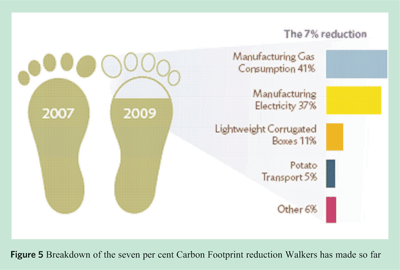

In addition to improving energy efficiency, we reduced carbon emissions within our logistics operation. By switching to 100 per cent British potatoes, Walkers saved 374,000 food miles per year. By training drivers in fuel efficient driving, fuel efficiency improved by five per cent. Overall, we reduced the emissions from transporting potatoes to our factories by 10 per cent.
We also began to tackle the 53 per cent of carbon emissions resulting from producing a packet of crisps that occur in the supply chain, before the raw materials even reach the factory. To fully address all parts of Walkers’ footprint reduction, we began a programme to work with suppliers and share best practice and expertise to minimise their carbon footprints. As part of this programme, we invited key suppliers for each raw material and packaging type to discuss how to minimise their carbon emissions. We encouraged our suppliers to calculate and share the carbon footprint of their Walkers related operations for 2007 and again for 2009. Through working with the Carbon Trust, these suppliers established processes to measure and track their emissions. In 2007 and 2008, Walkers brought these suppliers together at Sustainable Supply Chain Summits. The first summit focused on raising awareness of carbon footprinting and why collaborating with Walkers’ supply chain was essential. Through the Summit, PepsiCo wanted to communicate Walkers’ commitment to embedding sustainability across its operations – a key objective of its Environmental Sustainability Strategy. Through the summit we:
- Shared with suppliers the work Walkers had done with the Carbon Trust to scale and monetise the risks of climate change to the potato supply chain
- Invited the Carbon Disclosure Project (CDP) to explain its work through the newly established ‘Supply Chain Leadership Collaboration’. CDP facilitates climate change data collection to assess carbon emissions across the supply chain. We asked suppliers to respond to the CDP’s questionnaire concerning their climate change mitigation and adaptation strategies and actions
The second summit was a collaborative workshop where suppliers shared their data and analysis to date, setting the stage for future one-to-one check-in sessions to track progress. The Sustainable Supply Chain Summits helped develop a ‘chain of custody’ whereby every participant across the supply chain takes ownership of calculating their slice of the carbon footprint and identifying opportunities to reduce emissions during their ‘custody’ of the product. Twenty two per cent of the overall CO2e reduction of Walkers crisps between 2007 and 2009 was achieved through reductions in the carbon footprint of suppliers. This was achieved through a number of innovative techniques. We light-weighted packaging and improved the efficiency of production processes and will continue to work with suppliers over the next two years to achieve further reductions in emissions across the supply chain.
During 2008-9, Walkers, and PIUK more broadly, continued to engage face to face with suppliers to develop a more sustainable supply chain. Through the Carbon Reduction Label and the Carbon Disclosure Project Supply Chain Leadership Forum, Walkers and Quaker worked with their supply chains to drive carbon reduction. In May 2009, we held the first joint Walkers/Quaker supply chain summit where 14 suppliers joined us to discuss the next steps on our carbon reduction journey, and their support of our sustainable supply chain pledges. We plan to publish a joint supply chain carbon footprint reduction strategy in the next two years.
Empowering and engaging consumers on sustainability is a key part of our strategy to reduce our environmental impacts and make a positive difference. The launch of the Carbon Reduction Label on packs of Walkers Crisps in March 2007 was a clear demonstration of not only the brand’s commitment to reduce the carbon footprint of its products, but also its desire to inform consumers about the carbon consequence of the products and services they use every day. Evidence shows the label has raised consumer awareness of the environmental impact of everyday consumption (more information on the impact and reactions of carbon labelling can be found in our 2009 Report: Carbon Footprinting and Labelling Consumer Products), and that they believe public commitments to reduce will drive corporate action. We are now introducing the label to other products in our portfolio. Quaker has already begun displaying the Carbon Trust Carbon Reduction Label on packs of Quaker Oats, Oatso Simple Original and Oatso Simple Golden Syrup flavour, making it the first cereal to carry an on-pack carbon reduction commitment.
The Carbon Reduction Label is just one example of how we are, bit by bit, tackling the very real challenges that face us and making the journey to becoming a more sustainable company. It’s tough; we can’t do it alone, we must work collaboratively with suppliers, customers, governments and NGO’s and it’s a long-term process.
Embedding sustainability in our DNA
Earlier this year, our global CEO, Indra Nooyi, talked about what would define the leading companies of the 21st century. Indra said: “… [the] hard-edged leader, delivering a return on capital no matter what the social cost, I believe, is yesterday’s leader. The CEO [of the future] has to create sustainable value. They need to embed a culture of long-term thinking. They have a responsibility to the society that hosts them.”
Our challenge, over the next few years, is to truly embed sustainability into every aspect of our strategy and decision-making. That’s a hugely ambitious goal, but it is our responsibility to try. This is not simply altruism. Building sustainability and health into our corporate DNA creates longer-term strategic advantage. Sustainable businesses can cut costs, drive innovation, reduce risk and motivate employees. It can help our customers and increase consumer loyalty.




